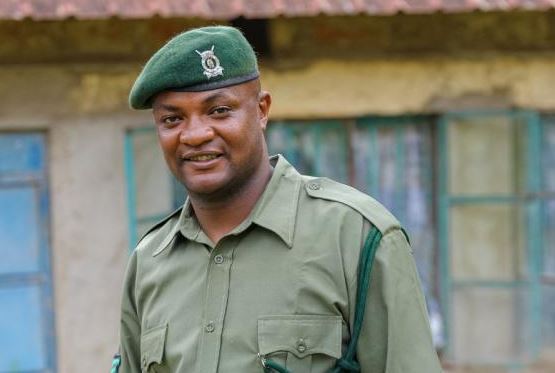
Sergeant David Mbitu Muchia- Kenya prisons officer who battled depression and now is a mental health awareness advocate. [Courtesy]
As cases of murder and suicide among police officers continue to rise, one Kenya Prisons officer, who is a mental health champion and substance abuse survivor has been at the forefront in creating awareness among his peers.
Sergeant David Mbitu, based at the Regional Prison Headquarters in King'ong'o Maximum Prison, Nyeri, says he has in the last five years been working with officers to address cases of depression and substance abuse among his colleagues.
“One of the challenges many officers face is; they do not realise the impact their work has on their mental health,” Mbitu says, noting that a big number of men in the forces rarely have confidants to discuss their problems with.
Mbitu says his struggle with depression and substance abuse started when he was younger.
“I had a troubled childhood because my mother could not provide my school fees, which frustrated me, and I started experimenting with marijuana. Sometimes I would sneak out of school to buy alcohol,” he says.
He adds that landing a job in the Kenya Prisons Service after high school, which he did in 2006, came as a relief to him. However, as a prisons officer, he had a very active social life, which masked the underlying mental anguish he was experiencing.
“At the time I didn’t realise I had depression, which I often masked by drinking alcohol and partying. After my first salary I applied for a loan of Sh300,000, which I blew in parties,” Mbitu says.
He notes that one of the challenges facing young recruits is lack of financial management skills, which leads to stress and hopelessness as they struggle to remain independent.
Mbitu says he married in 2008, but the union ended. He then remarried in 2012 and became a father. However, his drug abuse and depression persisted and this led to a divorce.
“Losing my daughter and wife really broke me, and it made me spiral out of control. I ended up in trouble with my superiors when I showed up to work late and intoxicated,” he says.
Mbitu recalls how at one point, he almost lost his job when he consumed alcohol exhibits that were to be presented as evidence in court. The turning point in his life was when he was diagnosed with acute colitis, which put his life in danger.
“While lying in my hospital bed, I made a decision to change my life. I quit alcohol and it has been four years of being sober.”
However, he still struggled with depression and had to seek help. “I had to endure ridicule from colleagues, many who do not believe in addressing mental health issues through counselling,” he says.
Since then, the officer has dedicated his efforts to work towards helping other prison officers in tackling mental health, drug abuse and financial management.
“I work in a mental health outreach programme within the Central Region Prisons Headquarters, which carries out training among the disciplined forces to help identify cases that need counselling and make the necessary interventions,” Mbitu says.
 The Standard Group Plc is a multi-media organization with investments in media
platforms spanning newspaper print
operations, television, radio broadcasting, digital and online services. The
Standard Group is recognized as a
leading multi-media house in Kenya with a key influence in matters of national
and international interest.
The Standard Group Plc is a multi-media organization with investments in media
platforms spanning newspaper print
operations, television, radio broadcasting, digital and online services. The
Standard Group is recognized as a
leading multi-media house in Kenya with a key influence in matters of national
and international interest.











